FOLLOWING FOOTSTEPS



our students’ dreams are our mission. And students have many dreams. It’s the 46-year-old mother of two who dreams of being a nurse. A 16-year-old high school student interested in a welding career. The 60-year-old retired grandfather who wants to learn more about small engine repair. And the 18-year-old high school grad who wants to finish his general education at CVTC and transfer to a four-year university.
We’re here for all of it.
To help make their dreams come true, we do not act alone. It takes a village. All of the communities in our 11-county district work with us in many ways to further our students in their education and careers.
In this magazine, you will see articles about students, alumni and instructors. These feel-good stories don’t happen by chance. It’s the hard work of all involved that creates success. But also, you will see businesses and organizations stepping in to help where needed.
For instance, you will read about River States Truck & Trailer – a diesel mechanic shop that not only employs CVTC students as they make their way through our program, but the general manager and many employees are CVTC alumni
as well. Their story, as unique as it sounds, is thankfully common.
Flip to Hope Perry’s story, and you’ll be immersed in her healthcare career journey with HSHS St. Joseph’s Hospital, one of our clinical partners in Chippewa Falls. Read about Jordan Drake – a ConAgra employee who benefited from his employer’s upskilling mindset. Because of that, he was able to take mechatronics classes to land the maintenance technician role he’d been hoping for.
Helping make these dreams come true can be summed up in one word: collaboration.
In order to further these dreams, this year, CVTC and the university partners in our district have strengthened our alliance to build toward seamless transfer of credits for our students who want to continue their education after attending CVTC.
I couldn’t be more proud of the work our higher education institutions have done and continue to do in pursuit of student success.
Gratefully, Dr. Sunem Beaton-Garcia

CHIPPEWA VALLEY TECHNICAL COLLEGE MAGAZINE IS PUBLISHED FOR ALUMNI AND THE SURROUNDING COMMUNITIES.
PRESIDENT Dr. Sunem Beaton-Garcia
VICE PRESIDENT OF STRATEGIC COMMUNICATIONS & COMMUNITY ENGAGEMENT Joni Geroux

VICE PRESIDENT OF INSTITUTIONAL ADVANCEMENT Karen Kohler
CONTENT STRATEGIST & WRITER Alyssa Van Duyse
GRAPHIC DESIGNER Mackenzie Slattery
CHIPPEWA VALLEY TECHNICAL COLLEGE 620 W. Clairemont Ave. Eau Claire, WI 54701-6162 715-833-6200 800-547-CVTC cvtc.edu
Motorcycle, Marine & Outdoor Power Products Technician Program
Cam chose CVTC’s small engine program because he would like to start his own business in the next five years. He already has a degree in IT, and he spent the last 15 years working in that field. Cam was also a wheel mechanic in the military for eight years.

Collaboration is the name of the game at Chippewa Valley Technical College.
In the spring, CVTC reaffirmed its commitment to collaboration by meeting with our regional university partners – UW-Eau Claire, UW-River Falls and UW-Stout. These gatherings aim to create better transfer pathways and support for students.
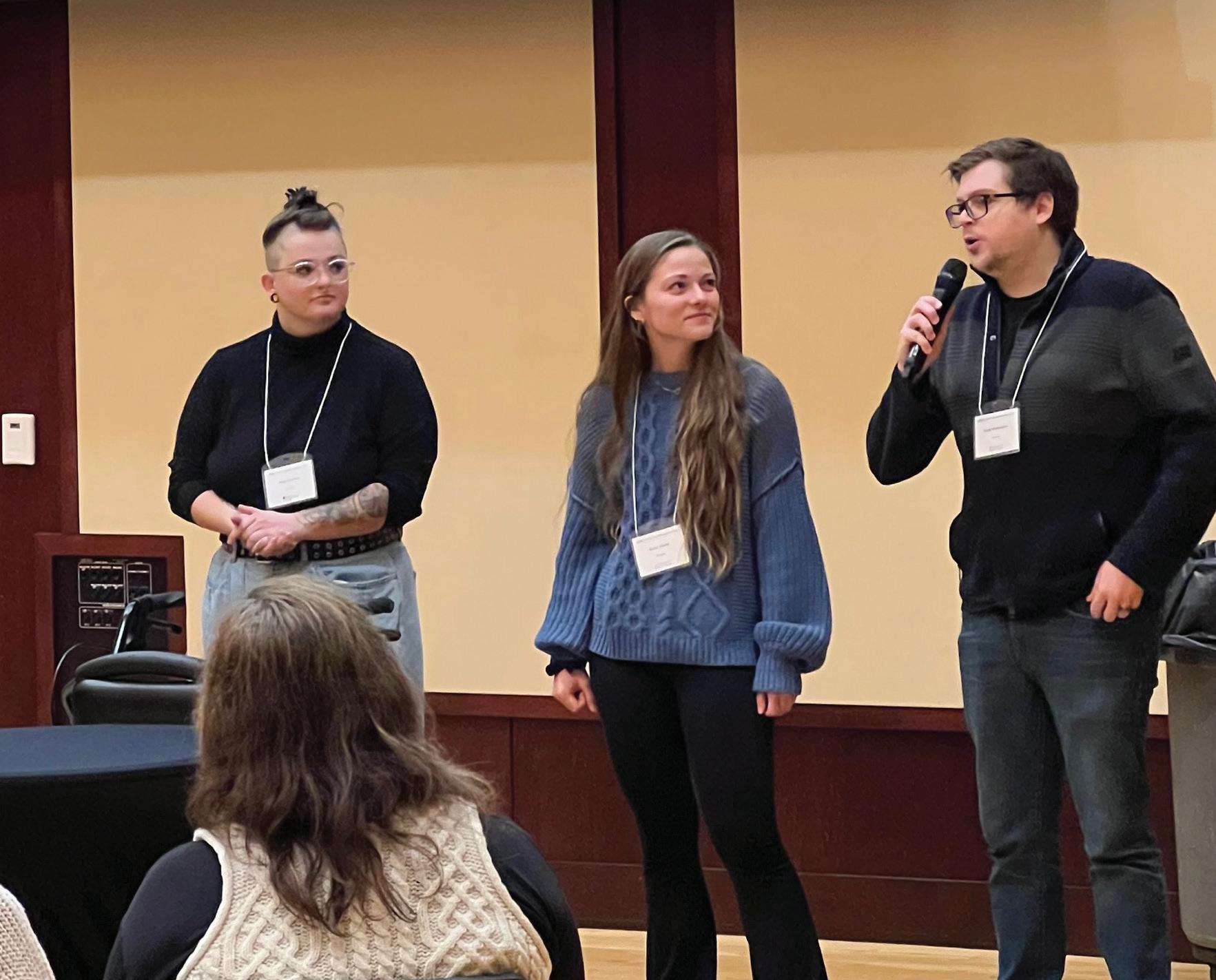
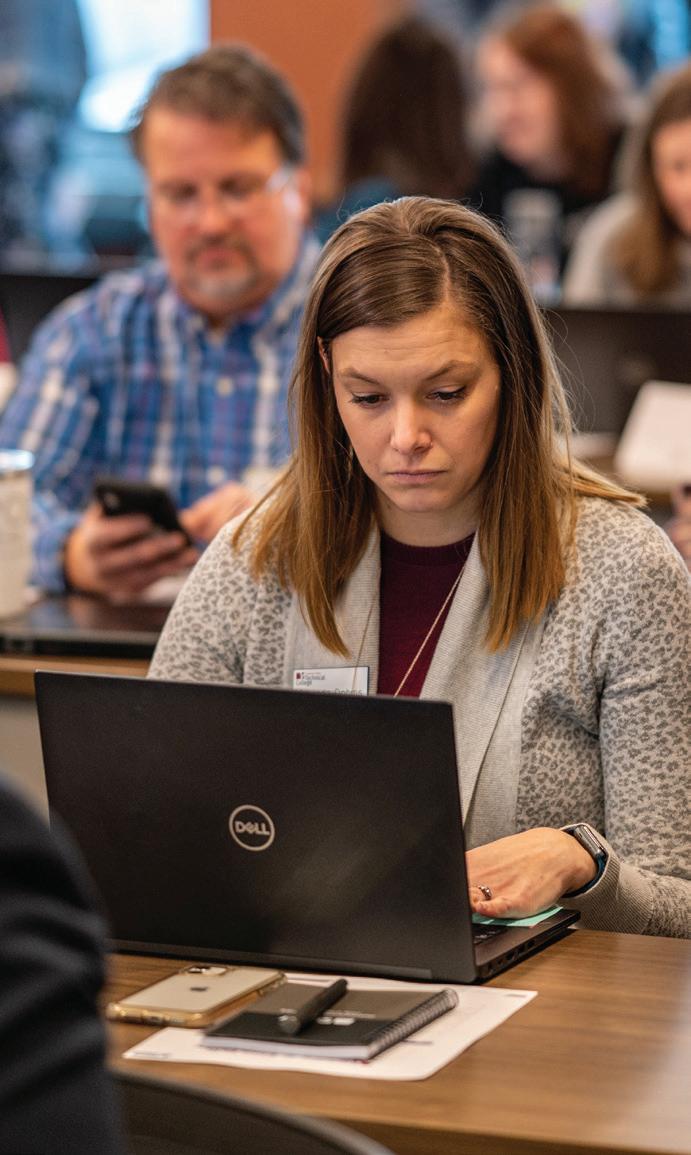
This collaborative partnership is highlighted in the new Asso ciate of Arts degree now offered at CVTC, which the Wisconsin Technical College System approved in May and by the UW System Board of Regents in June.
“It took thinking outside of the box and a can-do mindset,” said Sunem Beaton-Garcia, CVTC President. “In a short time, our university partners devised a plan to make credits from CVTC transfer to the universities in our district.”
Students enrolling in the As sociate of Arts degree at CVTC will benefit from guidance relative to students’ desired pathways by a dedicated advisor on CVTC campuses, supported by the universities.
“We need to meet students where they are. We must support them in their endeavors,” Beaton-Garcia said. “This higher edu cation collaboration does that and more. By removing barriers, we give students the opportunity to reach their goals so their dreams can be realized.”
It reminds students that higher education institutions in western Wisconsin put them front and center.
Students may not be ready for a four-year experience for many reasons, she said. Attending a technical college allows students to ease into university studies and life if they choose, she said.
“We are pleased to provide this remarkable opportunity for students across the district,” said Beaton-Garcia said. “The part nership with our UW institutions is of great importance, and I am grateful for their continued collaboration to provide increased transfer options for students.”
We need to meet students where they are. We must support them in their endeavors.
Vickie Murrey Hinrichs helps teach, yet she is always learning.
The 44-year-old paraprofessional in the Bloomer School District said it takes courage to learn something new and then incor porate it into her day-to-day teachings, and that’s exactly what Chippewa Valley Technical College has helped her do.
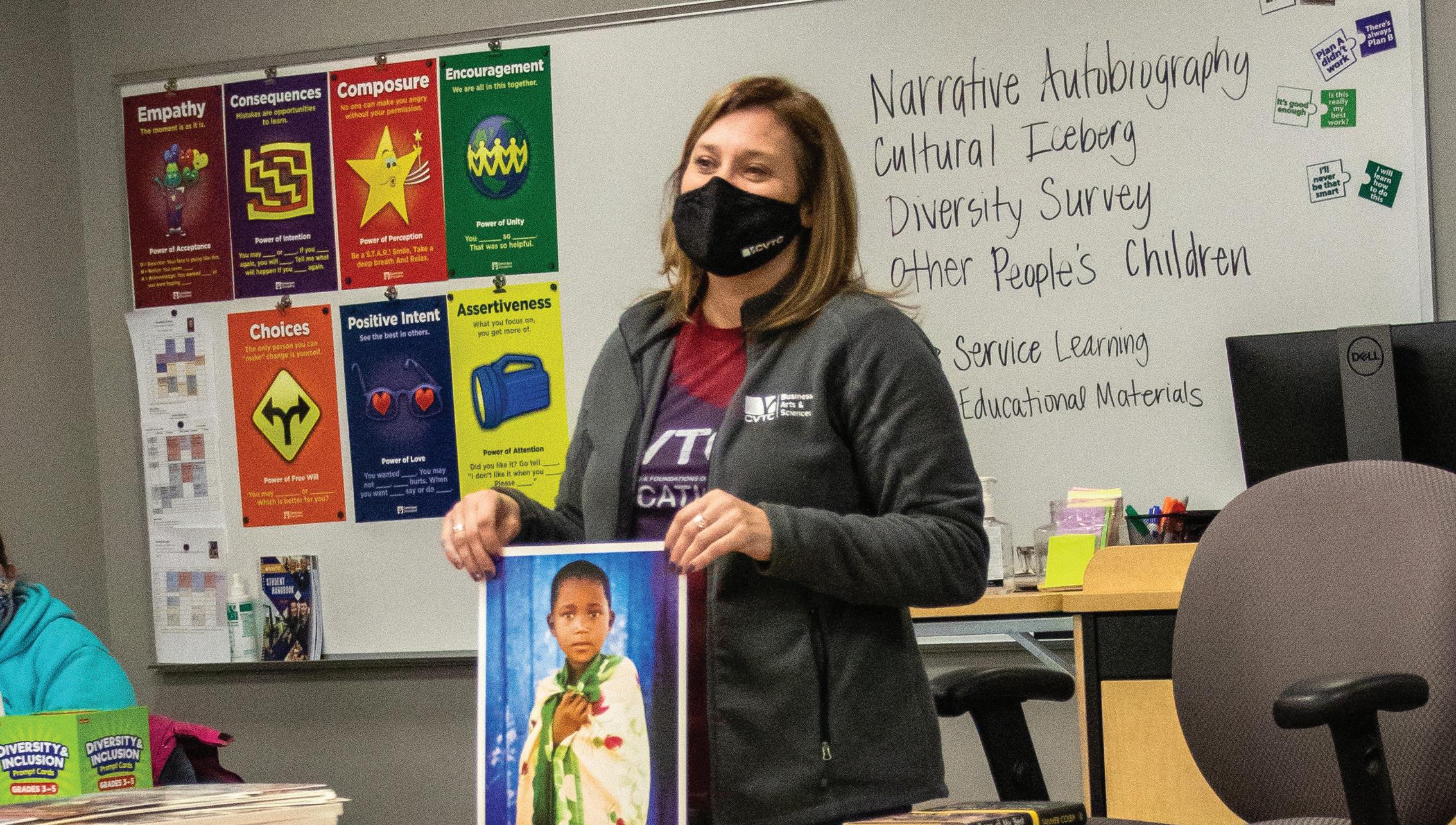
CVTC offers a series of classes about autism in the classroom aimed at paraprofessionals who are interested in additional training. At this time, these are non-credit courses, but students are provided with a portfolio to receive credit for prior learning, said Claire Lindstrom, CVTC Business Development and Continuing Education Specialist. The next course is available in December and quarterly thereafter.
“We’re always having conversations with organizations to learn more about their training needs,” Lindstrom said. “We have worked with school districts before, but this was a new oppor tunity to delve into new topic areas. Anything we can do to give them help and support and extra training, we will do.”
Michelle Zagozen, Director of Pupil Services for Durand-Arkan saw School District, is thankful for this opportunity for her staff.
“We wanted to support our paraprofessionals in developing and honing skills that they use in everyday practice and we thought this opportunity would allow professional growth and networking while still being accessible to folks working full time and with other obligations outside of work,” Zagozen said. “Additionally, we wanted to continue to foster and grow the district’s relation ship with CVTC.”
Zagozen anticipates paraprofessionals engaging in the courses will bring increased knowledge and confidence in their skills back to the classroom.
“Since participating in the program, they have brought back ideas that may help other staff members in their interactions with all students,” she said.
Missy Lesik, Cadott Community School District Special Educa tion & Pupil Services Director, said this opportunity ties directly with paraprofessionals’ job responsibilities in her district.
“The additional education courses will help our paraprofessional staff become even more skilled at meeting the diverse needs of all of our learners,” she said.
After becoming a National Center of Academic Excellence in Cyber Defense in January, Chippewa Valley Technical College has been awarded its certificate in recognition of significant contributions to the pool of skilled workers with cyber defense expertise.
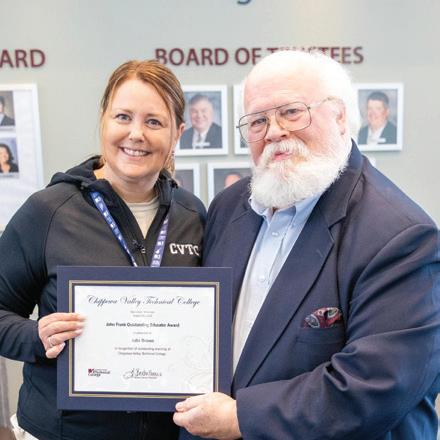
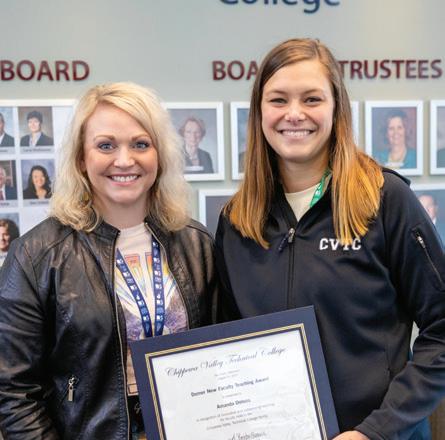
The designation in Cyber Defense for the National Security Agency program of study is good through the 2027 academic year.
Josh Huhmann, IT-Network Specialist instructor with CVTC, attended the National Initiative for Cybersecurity Education (NICE) conference and expo in June to accept the certificate.
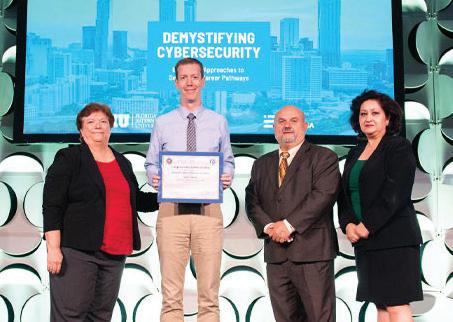
In addition to the designation and certificate, in November 2021, CVTC was approved to offer an Advanced Technical Certificate in Cybersecurity.
“Cybersecurity is something that influences every area of IT, and there has been so much growth in the security field,” he said. “We’re seeing value in offering additional education to make sure businesses are security-focused.”
The designation identifies CVTC as capable of supporting a cyber-secure nation and ultimately contributing to the protection of the national information infrastructure.
Entorf’s strong commitment to the program, her students’ education and their future shows. “She exceeds the call of duty in her role and position as an educator,” said one student.
JOHN FRANK OUTSTANDING EDUCATOR AWARD
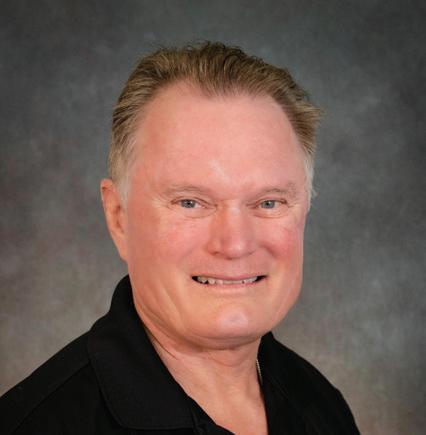
Brown thinks outside of the box to provide a top-notch education for her students. Students said they are inspired by her, she is easy to connect with, and they learn from her life experience.
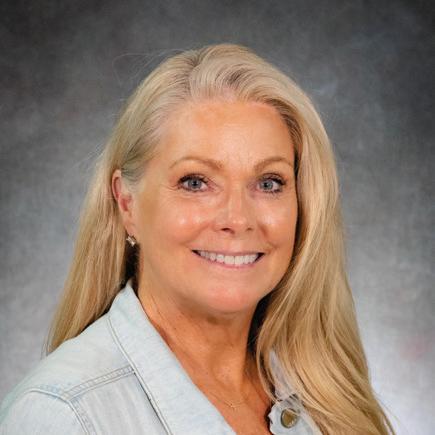
Dohms has risen as a leader at the College, and has shown leadership to help her depart ment navigate challenges. Dohms worked hard to create supportive learning environ ments that challenge students.
Traynor’s passion for the profession shines as a Criminal Justice program instructor.
“John expertly integrates decades of law enforcement experience with modern teaching methods,” said one CVTC dean.
Jordon Drake began working for ConAgra Foods in Menomonie four years ago as a dryer cell operator.
“It’s not the most exciting job,” Drake admits, “but I was excited to learn the process, to tear down and clean, and put it all back together.”
While doing that task, Drake, 31, realized he liked the mainte nance part of the job. Tearing apart the machine and putting it back together excited him more than his day-to-day role.
He appreciated the mechanical side of things. When a maintenance position became available, he applied but was told he didn’t have the necessary skills for the job.
“I didn’t grow up with someone who … liked to turn wrenches,” he said.

Thankfully, ConAgra and Chippewa Valley Technical College have a process in place to offer skills needed in the food
taken to shore up his skills include open lab which makes it easier for working students to get an education.
Falk, who has been teaching at CVTC for nearly five years, said students who come from industries have a distinct drive.
“They’re motivated because it’s helping them to advance in the industry,” Falk said. “Students select which courses they want to take, and it gives them an opportunity to a different pathway.”
Drake was impressed with what he had learned throughout the past few semesters.
“It was so eye-opening,” he said. “What I thought I knew, I didn’t. I focused on what I needed to learn to relate back to work. What I took out of those courses I’ve already used here. We just ran into the same issue here that I learned in class. It feels like less of a job and more of a career or passion.”
manufacturing businesses. For Drake, that means taking mechatronics classes at CVTC to gain the knowledge it takes to be a maintenance technician.
Drake said he wouldn’t have been able to go to school and work any other way.
“I don’t have the financial means to go to school full time,” Drake said.
Darrin Falk, Drake’s Mechatronics instructor at the CVTC Menomonie Campus, said the one-credit courses Drake has
After having a few courses under his belt, Drake moved into a maintenance position with ConAgra. Although Drake works 12-hour shifts and has a family, he still would like to keep working towards an associate degree at CVTC.
“I am proud of myself,” he said of working hard for what he wanted his career to be. “This was a perfect environment for someone like me to strive. I can get through it as fast as it works for me. It’s motivating.”
environment for someone like me to strive. I am proud of myself. This was a perfect
Mechatronics instructors at CVTC’s Menomonie Campus take a unique approach to teaching the courses, said Darrin Falk.
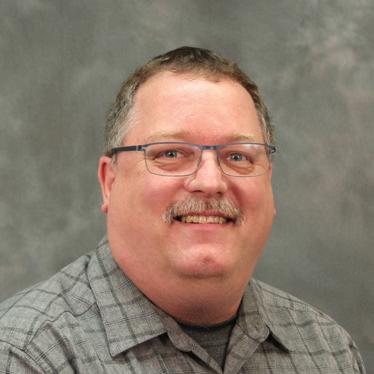
Falk has been teaching Mechatronics in Menomonie for three years. Making these courses available in Menomonie was imperative, Falk said.
“We’re filling a need that industry is seeing in the region,” he said. “Technology has changed so much – being a farm-trained mechanic isn’t enough.
“That’s kind of what our program is doing – giving people new tech nology and skills that will help them move forward.”
To cater to students with jobs and families, the mechatronics lab is open from 8 a.m. to 9 p.m., and students can start their 4-hour time blocks whenever they are able. A one-credit course takes 32 hours of instruction.
Falk teaches 14 classes, but on any given day, he could be teaching an incumbent worker taking their first class, a third-semes ter program student and a student ready for graduation, all at the same time in the lab.

“The growth I see in these students in the short amount of time is incredible,” Falk said.
DARRIN FALK MECHATRONICS SPECIALIST INSTRUCTOR, CVTC
When Erica Mitchell was a student at North High School, she was in the school district’s American Indian Education program. The coordinator helped students learn about their culture, make regalia for powwows and learn other crafts from their heritage.

“The program is literally to help teach the Native American students in our district and keep them connected,” she said. “It was so helpful when I was younger. I know how much it helped me to be in the program. It strengthens the Native American community within the schools.”
Fast-forward 20 years, and Mitchell, 37, now leads the program.
It’s something she never thought was possible, and without taking the right classes at Chippewa Valley Technical College, she doubts she would have landed the job.
In the Liberal Arts program (now the University Transfer program) she learned record-keeping, developmental psychology and numerous computer programs.
“If I hadn’t taken those classes at CVTC, I don’t know if I would have made it this far,” Mitchell said. “The Liberal Arts program for me was supposed to be a transition. I’m so glad I went this route.”
The American Indian Education program’s goal is to cater to Native American
students. Mitchell planned a beading event where Native American students learned about their culture.
“It’s a safe space, and somewhere the kids can go to hang out and get to know each other,” Mitchell said. “I have an opportunity to teach them what they didn’t know about themselves.”
It’s also an opportunity for her to connect with students and make sure they have the resources they need.
Michael Nickels, 39, CVTC mathematics instructor, taught Erica during the Spring 2021 semester. He was impressed by her motivation.
“It is no surprise to me that she was cho sen to be the Ameri can Indian Education Coordinator for ECASD,” he said.
“She advocates for and supports the needs of American Indian students in the district.”
Nickels said she be came a group leader.
“What amazed me about Erica was her ability to make almost instant connections between the concepts we talked about in our course and how they could be modified and applied to her current life,” he said.
Mitchell is proud of herself, too.
“I’m glad that in all of the Covid business I kept my head down and kept going with school. I made it a priority,” she said. “I still can’t believe I work here doing what I do.”
IF I HADN’T TAKEN THOSE CLASSES AT CVTC, I DON’T KNOW IF I WOULD HAVE MADE IT THIS FAR.
Hope Perry remembers visiting her grandpa Oral Perry at St. Joseph’s Hospital in Chippewa Falls as he led the imaging team.
Her grandfather would pull Wrigley’s Doublemint gum from his desk drawer and hand her a stick covered in shiny silver wrapping.
“He made enough of an impact on me to remember little things about him,” Hope said.
She was almost 4 when he died. There was no way for him to know that 21 years later, his granddaughter would follow in his footsteps. On July 17, Hope graduated with an associate degree in Radiography from Chippewa Valley Technical College, and she’s been hired at HSHS St. Joseph’s Hospital.
Hope was young when Oral died, but she remembers the sadness.
HOPE PERRY“I don’t think I comprehended it that well,” she said. “I remember everyone was crying. I didn’t understand, and then I learned he had a heart attack when he was jogging.”
Ray Myers, a former assistant administrator at St. Joseph’s Hospital who is now retired, said Oral would go for a run during his lunch breaks most days.
On May 7, 2001, Oral didn’t return to work from his jog. He had been a part of the hospital family for 40 years and planned to retire at the end of 2001.
As Hope grew, she continued to learn about her grandfather and his passion for his family and his career.
Myers, Oral’s supervisor, said he was a family man.
“Oral had this pick-up truck with a camper in the back,” Myers said. “He used to get so excited about taking the grand kids camping. He lived for that.”
He also was an advocate for student interns. While most people were in too much of a hurry for students, Oral would fight to have them, Myers said.
“He would come and talk to administration about why we should have them,” he said. “He helped pave the way. Little did he know he would be paving the way for his own granddaughter.”
Hope graduated from Chippewa Falls Senior High School in 2015 and began the Radiogra phy program at CVTC in August 2020.
Her dad told her about her grandfather’s work as director of radiology at St. Joseph’s. Oral’s son, Hope’s uncle, is also in the field.
That didn’t necessarily sway her decision about the future, but she’s proud of her family members who committed to the medical profession before her.
She began chipping away at her degree in Radiography five months after the world stopped because of Covid-19.
She took classes remotely and managed the huge curve of learning to help heal others without being in the same space as classmates and instructors. But Covid itself doesn’t daunt her. Healing the sick is her mission.
“It’s going to be my job to be there for those people – to take care of them no matter what,” she said. “We’re meant to han dle these things.”
Months ago, as Hope could see the educational finish line, she applied to work at HSHS St. Joseph’s Hospital. Her family’s history was not lost on her.
Now Hope, 24, of Chippewa Falls, has started her career in the same department her grandfather oversaw.
“I feel really honored to follow in (my grandfather’s) footsteps,” she said. “I’m so excited to be in the same hospital he was, doing the same thing.”
IT’S GOING TO BE MY JOB TO BE THERE FOR THOSE PEOPLE - TO TAKE CARE OF THEM NO MATTER WHAT.
I feel really honored to follow in
(my grandfather’s) footsteps. I’m so excited to be in the same hospital he was, doing the same thing.
- Hope Perry

SQUARE
OF ESEC In comparison, in 2019, the average square foot of a home in the U.S. was 2,301




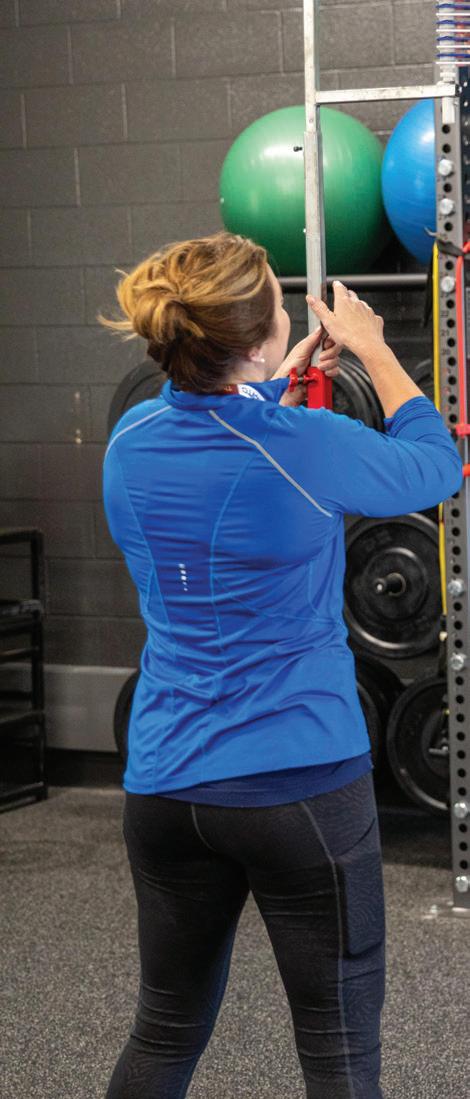

EV CHARGERS are available at TEC to further the mission of renewable energy
Chippewa Valley Technical College had a busy September. After more than a year of construction and anticipation, the College opened the renovated and expanded Emergency Service Education Center (ESEC) and the completely new Transportation Education Center (TEC). This is the first year since the College has offered transpor tation education that all of those programs are under one roof.
CVTC owes a sincere thank you to its taxpayers and donors who overwhelmingly approved a referendum to make these projects possible.
It’s the goal of the College to respond to the growing workforce labor shortage in the Chippewa Valley, accommodate evolving technology and industry expectations, improve safety and security on campus and in our communities, and prepare for the future by making structural improvements and land investments.
“The pride and immense care of this community were evident to me when I came to Chippewa Valley Technical College to interview for the President position,” said Sunem Beaton-Garcia, CVTC President. “It was then that I learned that communities in the CVTC district had passed a generous referendum to support the educational endeavors of the College. By saying yes to the vision for these state-of-the-art facilities, our communities have shown us that they are invested in the incredible trades represented here.”
Providing resources to the community and being responsible with taxpayer funds are two of CVTC’s core values. Investing in the future of our area through improved facilities and resources will keep our region thriving for years to come.

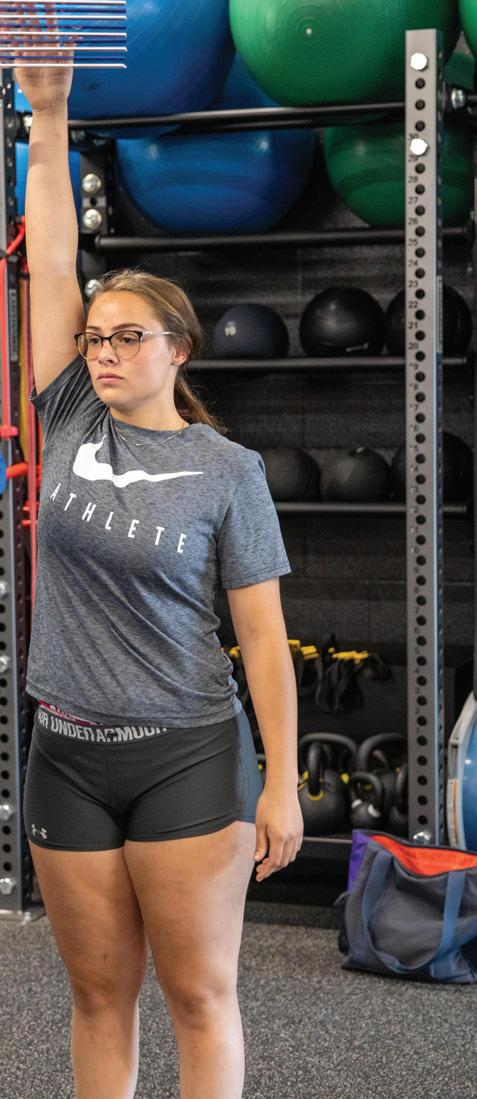
CVTC OUTFITS 66 FIRE STATIONS WITH DECONTAMINATION SUPPLIES
Chippewa Falls Fire Chief Lee Douglas remembers when having black soot on his helmet was a badge of honor.
“I call it foolish now, but that’s exactly what we did,” Douglas told Chippewa Valley Technical College President and employees after accepting supplies to decontaminate after a fire from the College. “That was kind of our way of saying, ‘Hey, look at me. I put out a fire.’ Now things like these buckets give us that opportunity to not carry that stuff with us.”
CVTC President Sunem Beaton-Garcia, Fire Training and EMS Continuing Education Manager Mark Schwartz, and CVTC Foundation representative Kaela Stendahl presented Chippewa Falls Fire & Emergency Services with two five-gallon buckets full of items like a self-retracting water hose, dish soap, a scrub brush and special shampoo.
Firefighters nowadays know to scrub and rinse after fighting fires but having the right items on the rig might not be top of mind. Schwartz and Stendahl put their heads together to change that.
“I originally got the idea from the state of Florida, which issued one of these buckets to every single fire engine in the state,” said Schwartz. “We’re using a lot of synthetics

when we’re building houses now, and when it burns, it turns into cancer-causing materials. When these firefighters are going into a structure fire, they’re wearing all of that stuff. Now they can wash it off before they even get back in the truck.”
Fundraising was a large part of the program’s success. CVTC colleagues and community members donated to the cause.
“I’m pleased to share that we raised more than $4,700 for this project, with the CVTC Alumni Association as our largest sponsor,” Stendahl said.
Many firefighters in the CVTC district of 11 counties are alumni. An estimated 50 percent of the Chippewa Falls fire department fire fighter-paramedics are graduates of CVTC.
Beaton-Garcia thanked Nate Martell, fire fighter paramedic lieutenant, Nick Mompier, firefighter paramedic, and the entire firefighter paramedic team in Chippewa Falls for putting their lives at risk daily.
“This is a small part of what we can do to show support for first responders,” she said. “Thank you so much for everything you do for our community. We wanted to make sure that we give you our best so you can be your best.”
CVTC Foundation, Inc. works to advance the mission of Chippewa Valley Technical College by providing unmet needs and addressing barriers to success that students encounter. In addition to our amazing faculty, staff, and students, the great work done at CVTC is possible because of the support of local businesses, community partners, alumni, and friends.
Thank you to those who support CVTC not only through the Foundation, but to employers who hire our graduates, family members who support our students and employees, and our entire community who champions technical education. We are grateful for your support and advocacy.
BY THE NUMBERSBob Tyman and Henry LeBakken are Chippewa Valley Technical College graduates. It’s not uncommon. There are thousands of CVTC alumni living and working throughout western Wisconsin.
What’s less common is the number of CVTC students and alumni working alongside Tyman and LeBakken at River States Truck and Trailer. In the business’ Eau Claire location alone, an additional 10 employees have utilized CVTC for Diesel Mechanic education in one form or another.
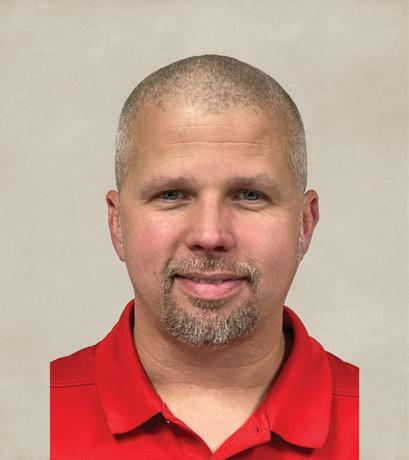
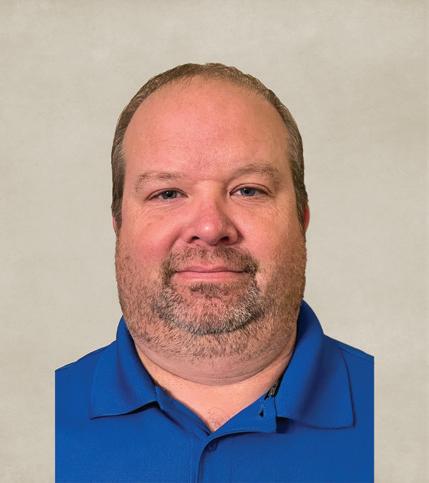
“I went through the diesel mechanic program from 1989 through 1991, and I know a couple guys who were there before me. That’s how far we go back,” Tyman said. “We started as diesel truck mechanics and worked our way up. If you want to work your way up into a management role, that can happen.”
Tyman said mentoring and hiring CVTC students is part of a mutually beneficial collaboration.
“The trucking industry continues to grow. Without trucks and drivers, we wouldn’t have gas, food or many supplies that we

all rely on daily. CVTC is a great starting point to get students the hands-on basics,” he said.
LeBakken said products in the die sel mechanic industry literally change every day.
“Manufacturers come out with new electronics,” he said. “Changes in the products are something mechanics are constantly learning.”
LeBakken, who is on the Diesel Truck Technician advisory committee at CVTC, said for students to be educated on the latest technologies and products, River States Truck and Trailer, DTNA and CVTC partner together to provide the latest products and engines for students to learn about at the College.
“We’re here to support CVTC and they do a great job of putting out great techs that continue to stay in the field too,” Tyman said. “We rely on CVTC a lot, and they rely on us.”
This course provides basic and intermediate soil knowledge as it applies to treating onsite wastewater in Wisconsin.

